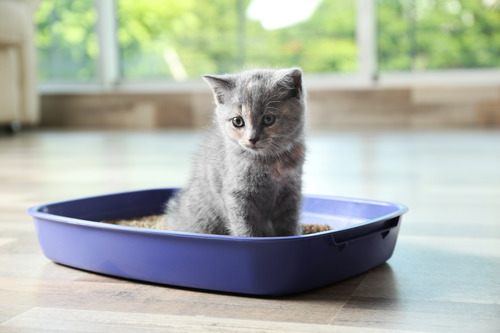Welcoming a new kitten into your home brings joy and curiosity about their development. One common question new pet owners have is, “When do kittens start pooping?” Understanding your kitten’s bowel habits is essential to ensuring their health and well-being. In this blog, we’ll explore the timeline of when kittens start pooping, what to expect during their early weeks, and how to support their digestive health. For more information or to schedule a check-up for your kitten, call Shawsheen Animal Hospital at (978) 851-5558 or request an appointment online.
The First Few Days: Birth to One Week
Kittens are born with their eyes closed and are entirely dependent on their mother for care. During the first week of life, kittens rely on their mother’s stimulation to encourage bowel movements. The mother cat will lick the kitten’s abdomen and genital area to stimulate pooping. At this stage, you may not notice the kittens pooping because the mother cat consumes the waste as part of her cleaning routine. This natural process is crucial for their early development.
Recognizing Healthy Development
Monitoring a kitten’s progress during the first week involves observing their weight gain, activity level, and response to their mother. Healthy kittens will steadily gain weight and appear content after nursing. If you notice any signs of distress or lack of weight gain, contact Shawsheen Animal Hospital for guidance.
Second Week: Increased Independence
By the second week, kittens begin to open their eyes and gain more mobility. While they still rely on their mother for stimulation, you might start to see them attempting to move away from the nest for short periods. Kittens’ digestive systems are maturing, but they still need their mother’s help for bowel movements.
Signs of Proper Bowel Movements
During this period, the mother’s continued stimulation is vital. You can observe her licking the kittens’ abdomens and genital areas, which indicates she is encouraging bowel movements. Kittens should appear healthy and active, with their abdomens slightly rounded from regular feeding.
Third Week: Gradual Transition
The third week marks a significant milestone in a kitten’s development. Their mobility improves, and they begin to explore their surroundings more. Around this time, kittens start to develop the ability to control their bowel movements independently, although they may still rely on their mother for assistance.
Introducing Litter Training
As kittens gain more independence, you can introduce them to a shallow litter box. Use a non-clumping, kitten-safe litter, and place the box in an accessible area. Gently place the kittens in the litter box after feeding to encourage them to use it. Be patient, as this process takes time and practice.
Fourth Week: Growing Independence
By the fourth week, kittens become more independent and may start to use the litter box regularly. Their bowel movements should become more consistent, and they should rely less on their mother for stimulation. This period is an excellent time to continue encouraging litter box use and monitor their progress.
Ensuring a Smooth Transition
To ensure a smooth transition, keep the litter box clean and accessible. If you notice any irregularities in their bowel movements or if they seem to struggle, consult Shawsheen Animal Hospital for advice. Regular veterinary check-ups during this stage can help identify any potential issues early on.
Fifth to Sixth Week: Establishing Routine
Kittens typically establish a regular bowel movement routine by the fifth and sixth weeks. They should be fully using the litter box independently, and their digestive systems should be more mature. At this stage, you can start to transition them to solid kitten food, which can affect their bowel movements.
Monitoring Diet and Digestion
Introduce solid food gradually to avoid digestive upset. Start with wet kitten food, and slowly incorporate dry kibble. Ensure fresh water is always available. Monitor their stools for any signs of diarrhea or constipation and adjust their diet as needed. If you have concerns, contact Shawsheen Animal Hospital for guidance.
Understanding Normal Bowel Movements
Understanding what constitutes normal bowel movements for kittens helps you monitor their health effectively. Healthy kitten stools should be formed but not hard, and they should have a consistent color and texture. Any significant changes in stool appearance or frequency warrant a veterinary consultation.
When to Seek Veterinary Care
Seek veterinary care if you notice any of the following:
- Persistent diarrhea or constipation
- Blood or mucus in the stool
- Straining or discomfort during bowel movements
- Changes in appetite or activity level
Early intervention can prevent minor issues from becoming severe health concerns.
Supporting Your Kitten’s Digestive Health
Supporting your kitten’s digestive health involves providing a balanced diet, regular veterinary check-ups, and maintaining a clean environment. Ensure they have access to fresh water, a proper diet, and a clean litter box. Regular play and exercise also promote healthy digestion and overall well-being.
Tips for Maintaining Digestive Health
- Balanced Diet: Choose high-quality kitten food and introduce new foods gradually.
- Hydration: Ensure fresh water is always available.
- Clean Environment: Keep the litter box clean and accessible.
- Regular Veterinary Visits: Schedule regular check-ups to monitor health and development.
- Observing Changes: Watch for changes in stool appearance, frequency, and consistency.
For more personalized advice, contact the team at Shawsheen Animal Hospital.
Ensuring Healthy Growth and Development
As your kitten grows, their digestive health plays a critical role in their overall development. Understanding when kittens start pooping and how to support their bowel movements ensures they thrive. If you have any concerns or questions about your kitten’s health, Shawsheen Animal Hospital is here to help. Contact us at (978) 851-5558 or request an appointment online for expert advice and care.






